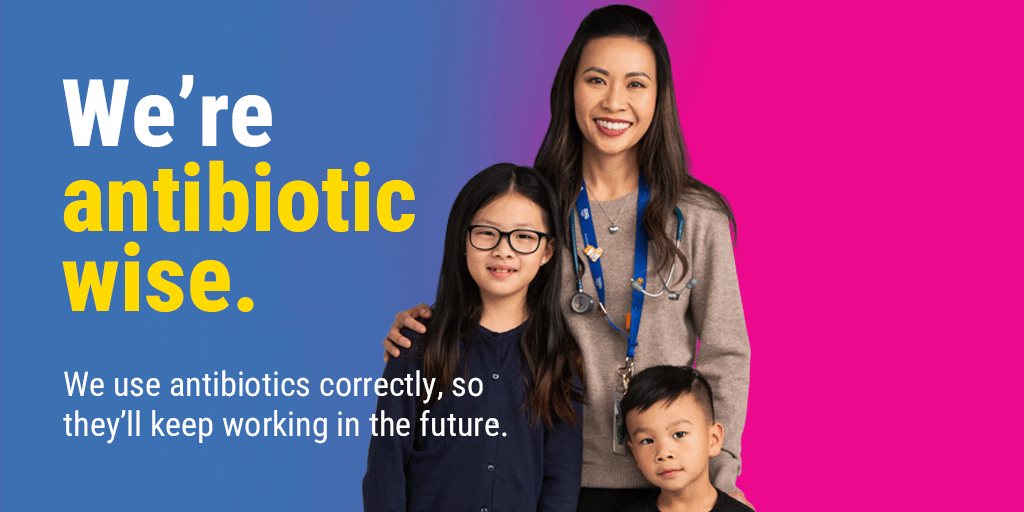
Antibiotic Quiz
Quiz-summary
0 of 9 questions completed
Questions:
- 1
- 2
- 3
- 4
- 5
- 6
- 7
- 8
- 9
Information
We invite you to take our quiz! Find out what you know and learn more about how you can enhance your health. Be one of our community partners in helping us preserve antibiotics.
You have already completed the quiz before. Hence you can not start it again.
Quiz is loading...
You must sign in or sign up to start the quiz.
You have to finish following quiz, to start this quiz:
Results
0 of 9 questions answered correctly
Time has elapsed
Categories
- Not categorized 0%
-
Thank you for completing the quiz!
- 1
- 2
- 3
- 4
- 5
- 6
- 7
- 8
- 9
- Answered
- Review
-
Question 1 of 9
1. Question
Antibiotics are used to treat colds and flu.
Correct
Antibiotics are NOT used to treat colds or flu as these are viral infections and antibiotics do not work against viral infections. Antibiotics fight infections caused by bacteria.
Incorrect
Antibiotics are NOT used to treat colds or flu as these are viral infections and antibiotics do not work against viral infections. Antibiotics fight infections caused by bacteria.
-
Question 2 of 9
2. Question
Handwashing is the best way to stop the spread of infections within your family (friends, work, etc.).
Correct
80 percent of common infections are spread by hands. Handwashing with regular soap and water is the best way to stop the spread of infections. Plain soap will remove the dirt and grease that attract bad bacteria and viruses without promoting antibiotic resistance in the bacteria that normally live on our hands or in our environment. Using antibacterial products unnecessarily increases the concentration of antibiotics in the water supply and in the environment and may contribute to antibiotic resistance.
Incorrect
80 percent of common infections are spread by hands. Handwashing with regular soap and water is the best way to stop the spread of infections. Plain soap will remove the dirt and grease that attract bad bacteria and viruses without promoting antibiotic resistance in the bacteria that normally live on our hands or in our environment. Using antibacterial products unnecessarily increases the concentration of antibiotics in the water supply and in the environment and may contribute to antibiotic resistance.
-
Question 3 of 9
3. Question
There are different types of antibiotics taken for different infections.
Correct
Different antibiotics are prescribed for different types of infections. Your healthcare provider is trained to recognize which infections require antibiotic treatment, and in some instances, able to order tests to determine which antibiotic will work best for your specific infection.
Incorrect
Different antibiotics are prescribed for different types of infections. Your healthcare provider is trained to recognize which infections require antibiotic treatment, and in some instances, able to order tests to determine which antibiotic will work best for your specific infection.
-
Question 4 of 9
4. Question
Leftover antibiotics can be used for other people in your house that become sick after you do.
Correct
Never share prescription medicine: the healthcare provider has chosen the medication and dose specifically for the patient. Note: If the same infection develops within a family or workplace, this often indicates a viral infection.
Incorrect
Never share prescription medicine: the healthcare provider has chosen the medication and dose specifically for the patient. Note: If the same infection develops within a family or workplace, this often indicates a viral infection.
-
Question 5 of 9
5. Question
When mucus (from nose or cough) turns green, it is time to get antibiotics.
Correct
Antibiotics are used to fight infections caused by bacteria, but not used for infections caused by viruses (such as cold and flu). Antibiotics do not help to fight colds. As the body starts fighting the virus, white blood cells attack and kill viruses. The dead virus cells in the mucus become darker and greener. As long as fever and other symptoms are improving, this is the natural course of an infection due to a virus.
Incorrect
Antibiotics are used to fight infections caused by bacteria, but not used for infections caused by viruses (such as cold and flu). Antibiotics do not help to fight colds. As the body starts fighting the virus, white blood cells attack and kill viruses. The dead virus cells in the mucus become darker and greener. As long as fever and other symptoms are improving, this is the natural course of an infection due to a virus.
-
Question 6 of 9
6. Question
Ear infections sometimes need antibiotics, and sometimes not.
Correct
Ear infections can be caused by viruses or bacteria. Even bacterial infections do not always need antibiotics. Many infections, like children’s ear infections, usually go away on their own.
Incorrect
Ear infections can be caused by viruses or bacteria. Even bacterial infections do not always need antibiotics. Many infections, like children’s ear infections, usually go away on their own.
-
Question 7 of 9
7. Question
Many people have side effects to antibiotics, such as loose stools or upset stomach.
Correct
Antibiotics can have side effects such as upset or sore stomach and loose stools. Upset or sore stomach and loose stools are common complaints and do not mean you are allergic to that antibiotic. If symptoms persist after finishing the antibiotics, or if you develop a rash or severe diarrhea, see your doctor right away.
Incorrect
Antibiotics can have side effects such as upset or sore stomach and loose stools. Upset or sore stomach and loose stools are common complaints and do not mean you are allergic to that antibiotic. If symptoms persist after finishing the antibiotics, or if you develop a rash or severe diarrhea, see your doctor right away.
-
Question 8 of 9
8. Question
Healthy elderly people with bacteria in their urine need antibiotics.
Correct
Bacteria in the urine, in the absence of signs and symptoms of infection, is referred to as asymptomatic bacteriuria (ASB), and does NOT indicate an infection requiring antibiotics. ASB is very common in the elderly, patients residing in long term care facilities, patients with long term catheters and patients with abnormal urinary tracts.
Incorrect
Bacteria in the urine, in the absence of signs and symptoms of infection, is referred to as asymptomatic bacteriuria (ASB), and does NOT indicate an infection requiring antibiotics. ASB is very common in the elderly, patients residing in long term care facilities, patients with long term catheters and patients with abnormal urinary tracts.
-
Question 9 of 9
9. Question
Antibiotics are needed when you have a tooth pulled at the dentist.
Correct
Most simple tooth extractions do not require antibiotics. Removing the tooth is usually enough to reduce pain and clear the infection.
Incorrect
Most simple tooth extractions do not require antibiotics. Removing the tooth is usually enough to reduce pain and clear the infection.



